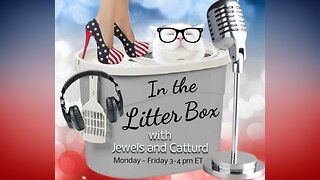Premium Only Content
![OP;ED - Academic Conservativism vs Neo-Academia [30/Jul/16]](https://1a-1791.com/video/s8/1/g/b/0/z/gb0zk.qR4e-small-OPED-Academic-Conservativis.jpg)
OP;ED - Academic Conservativism vs Neo-Academia [30/Jul/16]
TL;DR
Academic coservativism vs neo-academia, or I suppose nu-academia.
A sentence that probably makes a kind of sense to some but no sense at all to others on account of these being words or phrases that don't really exist and I've just tailored to help illustrate the point that I want to wax
lyrically about for a while today.
And it's in some ways about peer-review and it's various pitfalls, the future potential for human knowledge and the dangers of slipping into outright conservativism in regards to academia or I suppose to invent yet another
ridiculous phrase that sounds like it should mean impressive, neo-reactionary academics.
Anyway, enough with making up nonsense phrases and on with the actual concepts.
The internet is a wonderful tool. I contains an overwhelming amount of the sum total of human knowledge in various forms ranging from the massively complex scientific theories down to the plain mundane nonsense of everyday human
social interactions. Everything that is here, right now, is a massive amount of information that is a beautiful snapshot of the existance of the human species and it's nigh infinite complexity.
When the internet was young it was spoken about as a great new frontier, a brand new world, boarderless, with no limit on property space as we have in the physical world. If someone wanted to create a space, a virtual place to live
for their thoughts if you will, you can just, do it. And there was a sense of amazement, a sense of awe, that such a thing could exist, that we could isntantly transfer the thoughts of people, separated by thousands of miles in a near
instant
and have them available forever recorded for anyone to explore these ideas and either pare them down or expand them infinitely until we were able to finally total together all the pieces of humanities knowledge and thus
be able to transcende any lack of information or mis-information that we might have while always working towards more.
And this information would be free and avialable to all! Any person could locate any information that they needed or wanted, from academic papers and theories to simple entertainment and mumdane general knowledge facts. Better yet
people could bring any of this together, analyse it in whatever way they saw fit, present this information and have it, in essense, peer reviewed near instantly by dozens, hundreds, thousands, millions of people potentially.]
It promised to put academic knowledge in the hands of everyone, no longer would we have to be subjects to enclosed academics and think tanks, being bought off by private funding and grants or succumbing to their own internal biases.
Indeed, anyone who has ever faced the peer revied process will be aware of it's many features, which I think should be laid out here for clarity.
You would work on your paper, for however long it takes for you to gather resources, create methods, gather your own data if need be, analyse data etc.
This can take 1 year, 2 years, 3 years, 4 years however long.
Once complete you can submit it to a jounral of your choice where an editor then has two chocies. 1, desk rejection right on the spot, which may happen because you've picked the wrong journal and your paper wouldn't fit.
it might be rejected because it doesn't reach the quality standard of the journal or there's always the risk that the editor is prone to significant bias and simply doesn't like you or your topic or it's implications, at which
point you might try again and hope for a different editor. Yes, things like political and person bias absolutely do exist within the peer review and journaling process.
The editor will then pass your paper on to various other members of the editorial board, some of whom will be selected because their specialisation matches the topic of your paper or it might be handed to an outside researched
if that journal is lacking a specialist who can then give your work an appropriate review.
After these peer review your work you will receive an editorial letter that will either accept publication, very rare on your first try, but more likely will contain a list of recommended changes. these can vary from requests
to change methodolgy, requsts to clarify variable or control for variables, suggestions that there may be others papers you should read first because they have already covered a part of your reasearch that you missed.
At this point you review your work and either make the suggested corrections or you explain why you think these correction are not needed and resubmit to your editor and peers, this process will go through multiple rounds until
you eventually end up with your finished, and hopefully improved paper.
Of course this comes with its flaws. There are cases where your peers simply hold ideological views that are opposed to the topic or implications of your paper at which point they will offer advice that is less than
helpful. There are journals with peers who are simply, for lack of a better term, not very good who will miss faults with your paper or in some cases intionally allow faults if the results of the paper coincides with their
own works or biases. Basically peer review can be an amazing tool for good but can also be incredibly biased to almost echo-chamber levels depending on what journal it is you are submitting to.
Why do I bring this up? I consider both of these topics to be two parts of a whole to be considered together with some sweet irony. The advent of the internet gave us near unlimited communication ability to improve our own
knowledge and works as we see fit and yet, when new ideas come out of such a source, despite the fact that the internet contains many very intelligent people, some of whom are even on peer review boarders or work in a position
to be considered a peer on a piece of work. Anything that is produced from such a forum by individuals without "the right credentials" as it were, is instantly mocked and derided as worthless because it didn't come from academia,
it didn't come from an official research organisation and therefor must be worthless.
It creates a form of academic conservativism that is really rather unusual and is something we see coming up semi-frequently. People who will simply refuse or deny the findings of something unless it comes from the hallowed grounds
of academia despite academias many flaws and ability to fall into echo chamber level confirmation bias. I've seen scholars have their work dismissed for no other reason than it is not in a peer reviewed journal despite being
metholdologically sound and in many ways actually better than some research we've seen coming out of academia. For example "Feminist glaciology" a paper that went through peer review, a fact that still sends a chill down my
spine knowing that out there there is a journal with enough editors and peer to get such nonsense published in such a way that it appears to the lay person to actually have some degree of credibility.
To the nay sayers suggesting that non-academics can never hold value I remind them of the discovery of the Mpemba effect. An observation made by Erasto Batholomeo Mpemba, born in 1950 who observed that
in some circumstances, warm water can freeze faster than cold water. An observation that can be frequently reproduced, the method by which this happens is still up for debate. But the most important part
of this tale is that Mpemba made his observations in 1963. At the age of 10, when he and others students in his year 3 class would make ice cream by boiling milk, adding sugar and then freezing it. One day with limited
space in the freeze mpamba was boiling his milk, a class mate in a rush to not loose his space in the freezer simply mixed his milk with sugar and placed it, cold, into the freezer, mpemba, finished boiling his milk, mixed
in the sugar and placed his in the freezer. two hours later, mpembas ice cream has frozen and his friends was still a thick sludge. When Mepmba asked his teacher as to why, his teacher told him, "this cannot happen, you are mistaken".
Three years later Mpemba, wanting to demonstrate he was right took two 50 cublic centimeter beakers, filled one with cold water and one with hot water, placed them in a freezer and his findings were replicated.
When confronting his teacher Mr Osbourne about this his teacher priomised he would research this further himself while mpembas peers mocked him saying he had shamed his class for asking such questions.
True to his word his teacher did research this further and to this day this phenomenon is still being observed and debated. All as the result of one 13 year old boys curiosity and home based experiments.
I suppose the moral here is do not be so fast the judge and dismiss the findings of people just because they are not academics or just because their work has not been reviewed. Will it be perfect? Almost certainly not. Nothing
is first time around but to instantly hand wave away a hypothesis because of its source, is simply ridiculous in the same way that blindly accepting something because of it's source is ridiculous.
I say this because we live in the internet age. We are able, right now, to assess data and studies in ways that we simply couldn't before when information was locked purely in academic halls. People are researching, providing
new ideas, new thoughts, new observations everyday and when these findings and hypotheses are presented they will often find themselves being ridiculed and mocked or there will outright cries of "This data and conclusions
didn't come from a certified academic so we can't trust it!"
If there are large amounts
of data suggesting trends, investigate, don't just skim an abstract and accept or dismiss based on how you think or feel the data should or shouldn't be or because you don't like the person or people who present it
or you may find yourself to be no better than Mpembas class mates, when they ridiculed him for pointing out a simple observable truth.
Hopefully this has given you something to think about, I know it's been on my mine for a while how even the same things coming from two different points will accepted very differently by a wider audience and I do worry that the
fear of non-academics doing new and interesting research and ground work will hamper any real independant research and growth. The fear people have of knowledge being found and used seems to sometimes cause a bizare knee jerk reaction
and demand that knowledge must only be used by academics and that there are those out there whos work is being delegitmaized for not other reason than the platform they use to spread the work.
-
![TL;DR - How to (Actually) Read [06/Nov/23]](https://1a-1791.com/video/s8/1/F/u/G/0/FuG0n.0kob-small-TLDR-How-to-Actually-Read-0.jpg) 21:38
21:38
TL;DR
1 year agoTL;DR - How to (Actually) Read [06/Nov/23]
3.95K19 -
 LIVE
LIVE
In The Litter Box w/ Jewels & Catturd
21 hours agoBest Presidents' Day Ever! | In the Litter Box w/ Jewels & Catturd – Ep. 743 – 2/17/2025
5,370 watching -
 1:29:15
1:29:15
Simply Bitcoin
4 hours ago $4.24 earnedThey JUST Triggered A Global Gold Rush: $1M Bitcoin is coming! | EP 1184
41.8K9 -
 1:50:47
1:50:47
The Quartering
4 hours agoElon Musk's 13th Baby, Trump Attends Daytona 500, and Ramaswamy Enters the Ohio Governor's Race
68.4K24 -
 1:28:04
1:28:04
Russell Brand
4 hours agoBREAKING: UK Troops To Ukraine | Zelensky Wants “Army Of Europe” | JD Vance SLAMS EU Tyranny – SF538
112K43 -
 1:46:20
1:46:20
Benny Johnson
5 hours agoPANIC: Feds FLEE DC After Mass PURGE, Fired USAID Activists EXPOSED | Trump DOMINATES Daytona 500
113K107 -
 1:58:43
1:58:43
The Charlie Kirk Show
3 hours agoCBS Steps In It + Hockey Brawl + Judicial Standoff | Yoo, Schlapp, BigTree | 2.17.2025
103K31 -
 1:01:26
1:01:26
The Dan Bongino Show
7 hours agoTrump Is Cancelling DEI And Cancel Culture (Ep. 2424) - 02/17/2025
779K1.52K -
 1:06:12
1:06:12
Timcast
6 hours agoDemocrat Swamp IMPLODES, CBS Runs DAMAGE Control For Democrats, Gets ROASTED By Elon | Timcast LIVE
146K161 -
 2:00:58
2:00:58
RealAmericasVoice
12 hours agoWAR ROOM WITH STEVE BANNON AM EDITION
123K20